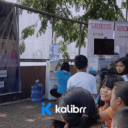How has the Philippine work landscape changed in 2020?

The start of a new decade in 2020 brought with it much discussion about the future of work. The World Economic Forum and McKinsey wrote about the rise of automation and digital transformation, as well as how workers need to upskill. Allwork discussed flexibility on when, how, where, how much, and with whom people work. Inc., on the other hand, cited mental health support and the importance of creating a psychologically safe work environment.
While the forecasts of many business thinktanks were on the mark, there is one global event that we certainly did not anticipate: the COVID-19 pandemic. In a matter of weeks, the workplace conversation changed from starting off a new year to responding to crises by being agile, collaborative, and resilient.
As we mark the start of a new year with much hope and greater optimism, we look back on the year that was and how the events of 2020 upturned the Philippine work landscape.
TOPICS
From ‘crisis mode’ to the ‘new normal’
2020 was the year of business unusual. With volcanic eruptions in January, super typhoons in November, and the COVID-19 pandemic that remains open-ended, the country was plagued by one crisis after another. The business continuity plans and work policies of companies across industries were put to the test.
Since the onset of these events, and especially as the pandemic went on for several months, many business leaders gradually shifted their approach from responding to disasters and working in crisis mode to managing risks and embracing the new normal.
Working from home is the new norm
Work-from-home arrangements began in the first quarter as an initial emergency response to ensure the continuity of business operations. But as the pandemic continues on even into 2021, what was meant to be an interim solution has now become very much a part of our new normal.
Unfortunately, working from home because of a crisis is very much different from the remote work and flexibility many employees hoped for. Working from home with little to no access to the office posed a new set of challenges in terms of connectivity, productivity, and work-life balance, even for the most ardent workers.
Work increasingly goes digital
When employees were sent home during the first weeks of the COVID-19 pandemic, many companies were frantic about adopting technology solutions so their teams could work remotely. Information technology leaders recognized the urgency of scaling up their connectivity, online collaboration, and digital workplace to ensure long-term resilience.
From recruitment to meetings to learning and engagement activities, the workplace became more and more digital as a result of staying safe at home for an extended period. According to Gartner, the pandemic accelerated the use of many digital workplace technologies from nice-to-have to must-have status.
Soft skills are put to the test
For many employees, career disruption, economic loss, anxiety, isolation, and loneliness have taken a toll. For some, there has also been suffering and the loss of loved ones.
As millions continue to work from home, it is not only the use of digital skills or the ability to use technology that is put to the test. In recent months, attributes such as self-awareness, motivation, self-management, empathy, and social skills have been sorely tested. Teams now emphasize the importance of active listening, resilience, perseverance, finding solutions, and having an abundance mentality. Remaining positive and optimistic when dealing with colleagues, management, and clients is essential.
Data privacy becomes a bigger concern
With employees working from home and sometimes using their own resources, it has become difficult to monitor exactly what kind of data they work with. Thus, in the past year, there was an increasing concern for safeguarding the personal data of clients even while working on personal devices and networks and with family members around. Also, companies have had to strike a fine balance between maintaining transparency in the workplace and protecting the privacy of employees who tested positive for COVID-19.
Wellness comes first
The events of 2020 hastened the focus on protecting the health, safety, and well-being of employees. This also includes making sure that the physical office is COVID-free and the digital workplace is a psychologically safe environment; that employees remain calm and focused; and that people continue to express their emotions and socialize, albeit virtually. However, ensuring that workers were healthy, energized, and motivated throughout the year was especially challenging, given that many people experienced anxiety, isolation, and depression amidst crises.
New year, new future?
There is no denying the fact that the COVID-19 pandemic has had the most significant impact on the way we worked in 2020, and in more ways than one. With recent developments on COVID-19 vaccines and, at the same time, news on another coronavirus strain, it seems what we experienced in the past year will likely continue in 2021.
Need help with recruitment? Sign up for Kalibrr and start engaging with the best candidates today!
Kalibrr is a technology company that aims to transform how candidates find jobs and how companies hire talent. Placing the candidate experience at the center of everything it does, the company continues to attract the best talent from all over, with almost three million professionals and counting. Kalibrr ultimately connects these talents to companies in search of their next generation of leaders.
The only end-to-end recruitment solutions provider in Southeast Asia, Kalibrr is headquartered in Makati, Philippines, with offices in San Francisco, California, and Jakarta, Indonesia. Established in 2012, it has served over 19,000 clients and is backed by some of the world’s most powerful start-up incubators and venture capitalists. These include Y Combinator, Omidyar Network, Patamar Capital, Wavemaker Partners, and Kickstart Ventures.
For more business and recruiter advice, follow Kalibrr on Facebook, Twitter, LinkedIn, and Instagram.






RMsQBtPQ
Report1
RMsQBtPQ
Report1
eEdGPbuT
Report1